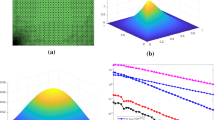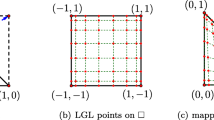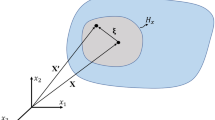Abstract
In a dual-weighted residual method based on the finite element framework, the Galerkin orthogonality is an issue that prevents solving the dual equation in the same space as the one for the primal equation. In the literature, there have been two popular approaches to constructing a new space for the dual problem, i.e., refining mesh grids (h-approach) and raising the order of approximate polynomials (p-approach). In this paper, a novel approach is proposed for the purpose based on the multiple-precision technique, i.e., the construction of the new finite element space is based on the same configuration as the one for the primal equation, except for the precision in calculations. The feasibility of such a new approach is discussed in detail in the paper. In numerical experiments, the proposed approach can be realized conveniently with C++ template. Moreover, the new approach shows remarkable improvements in both efficiency and storage compared with the h-approach and the p-approach. It is worth mentioning that the performance of our approach is comparable with the one through a higher order interpolation (i-approach) in the literature. The combination of these two approaches is believed to further enhance the efficiency of the dual-weighted residual method.








Similar content being viewed by others
Data Availability
Data sharing not applicable to this article as no datasets were generated or analysed during the current study.
References
Babuška, I., Miller, A.: The post-processing approach in the finite element method-Part 1: calculation of displacements, stresses and other higher derivatives of the displacements. International Journal for numerical methods in engineering 20(6), 1085–1109 (1984)
Babuška, I., Miller, A.: The post-processing approach in the finite element method-part 2: the calculation of stress intensity factors. International Journal for numerical methods in Engineering 20(6), 1111–1129 (1984)
Babuška, I., Miller, A.: A feedback finite element method with a posteriori error estimation: Part I. The finite element method and some basic properties of the a posteriori error estimator. Computer Methods in Applied Mechanics and Engineering 61(1), 1–40 (1987)
Eriksson, K., Johnson, C.: An adaptive finite element method for linear elliptic problems. Mathematics of Computation 50(182), 361–383 (1988)
Eriksson, K., Johnson, C.: Adaptive finite element methods for parabolic problems I: A linear model problem. SIAM Journal on Numerical Analysis 28(1), 43–77 (1991)
Eriksson, K., Estep, D., Hansbo, P., Johnson, C.: Introduction to adaptive methods for differential equations. Acta numerica 4, 105–158 (1995)
Becker, R., Rannacher, R.: A feed-back approach to error control in finite element methods: Basic analysis and examples. East-West Journal of Numerical Mathematics 4 (1996)
Becker, R., Rannacher, R.: Weighted a Posteriori Error Control in FE Methods, (1996)
Becker, R., Rannacher, R.: An optimal control approach to a posteriori error estimation in finite element methods. Acta numerica 10, 1–102 (2001)
Rannacher, R.: Adaptive galerkin finite element methods for partial differential equations. Journal of Computational and Applied Mathematics 128(1–2), 205–233 (2001)
Peraire, J., Patera, A.: Bounds for linear-functional outputs of coercive partial differential equations: local indicators and adaptive refinement. Studies in Applied Mechanics 47, 199–216 (1998)
Prudhomme, S., Oden, J.T.: On goal-oriented error estimation for elliptic problems: application to the control of pointwise errors. Computer Methods in Applied Mechanics and Engineering 176(1–4), 313–331 (1999)
Giles, M., Larson, M., Levenstam, M., Suli, E.: Adaptive error control for finite element approximations of the lift and drag coefficients in viscous flow (1997)
Giles, M.B., Süli, E.: Adjoint methods for PDEs: a posteriori error analysis and postprocessing by duality. Acta numerica 11, 145–236 (2002)
Bangerth, W., Rannacher, R.: Adaptive Finite Element Methods for Differential Equations, Springer Basel AG 2003
Rannacher, R.: Error Control in Finite Element Computations, pp. 247–278. Springer, Dordrecht (1999)
Bangerth, W., Geiger, M., Rannacher, R.: Adaptive galerkin finite element methods for the wave equation. Computational Methods in Applied Mathematics 10(1), 3–48 (2010)
Kormann, K.: A time-space adaptive method for the Schrödinger Equation. Communications in Computational Physics 20(1), 60–85 (2016)
Bruchhäuser, M.P., Schwegler, K., Bause, M.: Numerical study of goal-oriented error control for stabilized finite element methods. In: Chemnitz Fine Element Symposium, pp. 85–106 (2017). Springer
Rabizadeh, E., Bagherzadeh, A.S., Anitescu, C., Alajlan, N., Rabczuk, T.: Pointwise dual weighted residual based goal-oriented a posteriori error estimation and adaptive mesh refinement in 2d/3d thermo-mechanical multifield problems. Computer Methods in Applied Mechanics and Engineering 359, 112666 (2020)
Avijit, D., Natesan, S.: An efficient DWR-type a posteriori error bound of SDFEM for singularly perturbed convection-diffusion PDEs. Journal of Scientific Computing 90(2), 1–16 (2022)
Li, R.: On multi-mesh h-adaptive methods. Journal of Scientific Computing 24(3), 321–341 (2005)
Verfürth, R.: A Posteriori Error Estimation Techniques for Finite Element Methods, OUP Oxford,2013
Liu, C., Hu, G.: https://github.com/Mixed-DWR/MP-DWR_Example2.git
Heuveline, V., Rannacher, R.: A posteriori error control for finite element approximations of elliptic eigenvalue problems. Advances in Computational Mathematics 15(1), 107–138 (2001)
Gedicke, J.M.: On the numerical analysis of eigenvalue problems. PhD thesis, Humboldt-Universität zu Berlin, Mathematisch-Naturwissenschaftliche Fakultät II (2013). https://doi.org/10.18452/16841
Bao, G., Hu, G., Liu, D.: An h-adaptive finite element solver for the calculations of the electronic structures. Journal of Computational Physics 231(14), 4967–4979 (2012). https://doi.org/10.1016/j.jcp.2012.04.002
Bao, G., Hu, G., Liu, D.: Numerical solution of the Kohn-Sham equation by finite element methods with an adaptive mesh redistribution technique. Journal of Scientific Computing 55(2), 372–391 (2013)
Hu, G., Meng, X., Yi, N.: Adjoint-based an adaptive finite volume method for steady euler equations with non-oscillatory k-exact reconstruction. Computers & Fluids 139, 174–183 (2016)
Yang, L., Hu, G.: An adaptive finite element solver for demagnetization field calculation. Advances in Applied Mathematics and Mechanics (2019)
Meng, X., Hu, G.: A nurbs-enhanced finite volume method for steady euler equations with goal-oriented \(h\)-adaptivity. Communications in Computational Physics (2022)
Köcher, U., Bruchhäuser, M.P., Bause, M.: Efficient and scalable data structures and algorithms for goal-oriented adaptivity of space-time fem codes. SoftwareX 10, 100239 (2019)
Bruchhäuser, M.P., Schwegler, K., Bause, M.: Dual weighted residual based error control for nonstationary convection-dominated equations: potential or ballast? In: Boundary and Interior Layers, Computational and Asymptotic Methods BAIL 2018, pp. 1–17 (2020). Springer
Sleeman, M.K., Yano, M.: Goal-oriented model reduction for parametrized time-dependent nonlinear partial differential equations. Computer Methods in Applied Mechanics and Engineering 388, 114206 (2022). https://doi.org/10.1016/j.cma.2021.114206
Acknowledgements
The research of G. Hu was partially supported by National Natural Science Foundation of China (Grant Nos. 11922120 and 11871489), FDCT of Macao SAR (0082/2020/A2), MYRG of University of Macau (MYRG2020-00265-FST) and Guangdong-Hong Kong-Macao Joint Laboratory for Data-Driven Fluid Mechanics and Engineering Applications (2020B1212030001).
Author information
Authors and Affiliations
Corresponding author
Ethics declarations
Conflict of interest
The authors declare no competing interests.
Additional information
Publisher's Note
Springer Nature remains neutral with regard to jurisdictional claims in published maps and institutional affiliations.
Rights and permissions
Springer Nature or its licensor (e.g. a society or other partner) holds exclusive rights to this article under a publishing agreement with the author(s) or other rightsholder(s); author self-archiving of the accepted manuscript version of this article is solely governed by the terms of such publishing agreement and applicable law.
About this article
Cite this article
Liu, C., Hu, G. An MP-DWR method for h-adaptive finite element methods. Numer Algor 94, 1309–1329 (2023). https://doi.org/10.1007/s11075-023-01536-7
Received:
Accepted:
Published:
Issue Date:
DOI: https://doi.org/10.1007/s11075-023-01536-7




